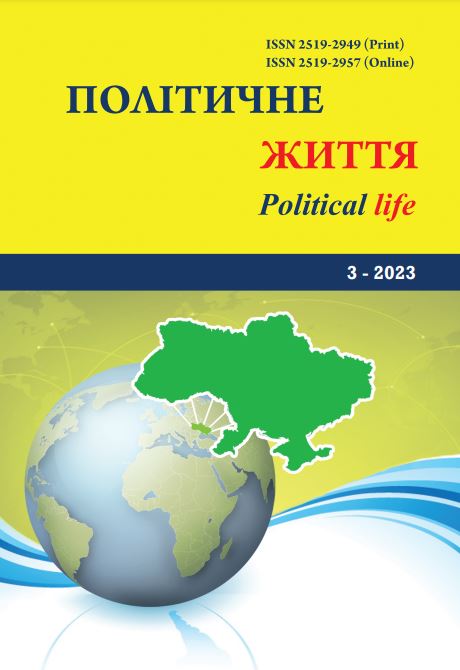The asynchrony of democratisation as a global trend in the new world order formation
DOI:
https://doi.org/10.31558/2519-2949.2023.3.15Keywords:
world order; asynchrony (nonlinearity) of the world order; subjectlessness of trends; subjects of world political processes; democratisationAbstract
The article explores democratisation as a global trend in forming a new world order. The author defines this term as a generalised name for a range of processes, phenomena, developmental trends, and political practices that determine systemic global shifts, encompassing their sequence, content, nature, subjectivity, and future prospects. The evolution of the world order comprises a multifaceted and multi-layered patchwork of asynchronous shifts across various levels (local territories, states, regions, globally) and in diverse domains, including global technological advances, economic elements, environmental concerns, and socio-cultural transitions. While the decisions or actions of distinct actors might momentarily influence the pace of these changes—either slowing or hastening them in specific sectors or levels—such subject-driven impacts can't entirely alter the subjectless trends that guide the general momentum and orientation of transformation.
Using methods from applied political and correlation analysis, the author posits that democratisation, as a characteristic of the world order, has its inherent dynamics and tempo, leading to the asynchrony of political shifts in the contemporary world order. This asynchrony is manifested, among other things, in the uneven dissemination of democratic institutions and practices at the levels of specific regions and states, the coexistence of monarchical and republican governance structures, and the adoption of select democratic institutions and practices by autocratic governments. The asynchronicity and diversity of political systems worldwide require adopting and transforming democratic institutions. These changes are influenced by various elements of the world order, including the global economic framework, the evolution of information and communication systems, and migration patterns. The rising polarisation, antagonism, crisis in political representation, and direct actions for global justice spur the search for innovative public policy models and consensus-building strategies. The author concludes that despite stratifying forces, such as subject-driven authoritarian rollbacks, democratisation persists as the predominant subjectless trend in the world order.
References
Berrada M. et al. World Protests: A Study of Key Protest Issues in the 21st Century. Cham: Palgrave Macmillan, 2022.
Brannen S., Haig C. S., Schmidt K. The Age of Mass Protests: Understanding an Escalating Global Trend. URL: https://www.csis.org/analysis/age-mass-protests-understanding-escalating-global-trend (дата звернення: 16.08.2023).
Carothers T., O'Donohue A. How to Understand the Global Spread of Political Polarization. URL: https://carnegieendowment.org/2019/10/01/how-to-understand-global-spread-of-political-polarization-pub-79893 (дата звернення: 16.08.2023).
Dahrendorf R. Reflections on the Revolution in Europe: In a letter intended to have been sent to a gentleman in Warsaw. New York: Random House, 1990..
Dalio R. Principles for Dealing with the Changing World Order: Why Nations Succeed and Fail. Avid Reader Press / Simon & Schuster, 2021.
Economist Intelligence Unit. Democracy Index 2022: Frontline democracy and the battle for Ukraine. URL: https://pages.eiu.com/rs/753-RIQ-438/images/DI-final-version-report.pdf (дата звернення: 16.08.2023).
Farrell H., Han H. Public Governance and Global Politics after COVID-19. In: Gavin F. J., Brands H. (Eds.), COVID-19 and World Order: The Future of Conflict, Competition, and Cooperation. Baltimore: Johns Hopkins University Press, 2020. С. 238–258.
Fletcher School at Tufts University. Digital in the time of COVID. URL: https://sites.tufts.edu/digitalplanet/files/2021/03/digital-intelligence-index.pdf (дата звернення: 16.08.2023).
Flockhart T., Korosteleva A. War in Ukraine: Putin and the multi-order world, Contemporary Security Policy, 2022, 43:3, 466-481, DOI: 10.1080/13523260.2022.2091591
Freedom House. Freedom in the World 2023: Marking 50 Years in the Struggle for Democracy [Report]. URL: https://freedomhouse.org/report/freedom-world/2023/marking-50-years (дата звернення: 16.08.2023).
Freedom House. Nations in Transit 2023: War Deepens a Regional Divide. URL: https://freedomhouse.org/sites/default/files/2023-05/NIT_2023_Digital.pdf (дата звернення: 16.08.2023).
Global Trends 2030: Alternative Worlds. The National Intelligence Council, Great Britain. 2012. URL: https://www.dni.gov/files/documents/GlobalTrends_2030.pdf (дата звернення: 16.08.2023).
Guriev S., Treisman D. Spin Dictators: The Changing Face of Tyranny in the 21st Century. Princeton: Princeton University Press, 2022. 324 с.
Huntington S. P. The Third Wave: Democratization in the Late Twentieth Century. University of Oklahoma Press, 1991. 412 с.
Levitsky S., Way L. A. Competitive Authoritarianism: Hybrid Regimes after the Cold War. Cambridge: Cambridge University Press, 2010. 540 с.
Low J. After Method Mess in social science research. L-N.Y.: Routledge, 2004. 210 с.
Mouffe C. The Democratic Paradox. Verso, 2000. 240 с.
Naisbitt J. Megatrends: Ten New Directions Transforming Our Lives. New York, Warner Books, 1982. 304 с.
Norris P., Inglehart R. Cultural Backlash: Trump, Brexit, and Authoritarian Populism. Cambridge: Cambridge University Press, 2019. 554 с.
OECD. Innovative Citizen Participation and New Democratic Institutions: Catching the deliberative wave [Report]. URL: https://www.oecd.org/gov/open-government/innovative-citizen-participation-new-democratic-institutions-catching-the-deliberative-wave-highlights.pdf (дата звернення: 16.08.2023).
Scarrow S. E. The Changing Nature of Political Party Membership. Oxford Research Encyclopedia of Politics. 2017. DOI: https://doi.org/10.1093/acrefore/9780190228637.013.226.
Zinchenko, O. V. Peculiarities of Arab monarchies forms of government (comparative analysis). Journal of the National Academy of Legal Sciences of Ukraine, 2018, 25(1), 50–64.

